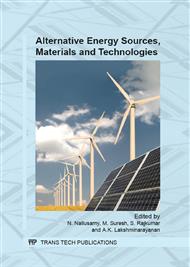p.823
p.828
p.833
p.838
p.843
p.848
p.854
p.859
p.864
Energy Optimization of Solar Micro-Grid Using Multi Agent Reinforcement Learning
Abstract:
In this paper, two solar Photovoltaic (PV) systems are considered; one in the department with capacity of 100 kW and the other in the hostel with capacity of 200 kW. Each one has battery and load. The capital cost and energy savings by conventional methods are compared and it is proved that the energy dependency from grid is reduced in solar micro-grid element, operating in distributed environment. In the smart grid frame work, the grid energy consumption is further reduced by optimal scheduling of the battery, using Reinforcement Learning. Individual unit optimization is done by a model free reinforcement learning method, called Q-Learning and it is compared with distributed operations of solar micro-grid using a Multi Agent Reinforcement Learning method, called Joint Q-Learning. The energy planning is designed according to the prediction of solar PV energy production and observed load pattern of department and the hostel. A simulation model was developed using Python programming.
Info:
Periodical:
Pages:
843-847
DOI:
Citation:
Online since:
August 2015
Authors:
Price:
Сopyright:
© 2015 Trans Tech Publications Ltd. All Rights Reserved
Share:
Citation:


